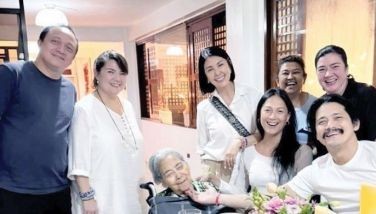Vangie Labalan's Christmas memories
MANILA, Philippines - A good two weeks before Christmas, Vangie Labalan decides to spend a few hours to reflect on her reel and real life.
In this modest restaurant near the two rival TV stations, she shares her collections of antique mementos she acquired while shooting films in various parts of the country.
In the resto-cum-workshop venue, she helps hone new showbiz discoveries before they face the cameras. “I just rediscovered the joy of teaching,” says Vangie who was born Maria Cristina Labalan in Bacolod City some 60-or so-years ago. “When I see those young faces listening and believing in you, I feel pure joy. In my time, I had to learn acting my own way. There were no acting workshops in the ’60s when I started as a radio drama talent.”
On this Christmas of 2010, she is observing her 39th year in show business that started in Bacolod City in the early ’60s.
 With Nora Aunor in Ishmael Bernal’s Himala. Her showbiz life started in Bacolod and ended in the Big City where she produced radio and TV commercials, acted on stage and film and got to work with Lino Brocka, Ishmael Bernal and Marilou Diaz-Abaya, among others.
With Nora Aunor in Ishmael Bernal’s Himala. Her showbiz life started in Bacolod and ended in the Big City where she produced radio and TV commercials, acted on stage and film and got to work with Lino Brocka, Ishmael Bernal and Marilou Diaz-Abaya, among others. For now, she is a widow, a mother of four and a grandmother of eight. Three children — Marlon, April and Tangerine — are now based in Australia and most likely, she will spend Christmas with her youngest son, Carlo and two grandsons who have decided to remain in Manila.
For those not updated on showbiz, Vangie is still visible on TV these days. She is the mother of Angel Locsin in the teleserye, Immortal and the Madam (textmate of Eugene Domingo) in the comedy show, Jejemom. She was Denang in Darna and Yaya Rosa in Kung Mahawi Man Ang Ulap, among others.
On film, she has won acclaim as the mother of Nora Aunor in the landmark Ishmael Bernal film, Himala, the desperate female prisoner in Marilou Diaz-Abaya’s Alyas Baby Tsina; the food vendor in Lino Brocka’s Miguelito: Ang Batang Rebelde; and the mother of a hermaphrodite in Chito Roño’s Curacha, among others. “I started as a radio talent in Bacolod in 1962,” she says. “At that time, radio was big time because television had yet to lord over broadcast media. I remember the Christmas on this phase of my life because this was my first job. I finished A.B. English but I turned to radio to help support a growing family. On Christmas days, we were a happy family. We were not earning much then but were one big happy family at the time.”
She was married to a good-looking casino-dealer who also sang. For a while, he worked in Manila, then came back to Bacolod when the casinos were padlocked when martial law was declared. Then they exchanged places: She went to Manila to try her luck on radio and TV leaving behind the husband and children.
Soon, she was coaching new talents of Bernal, Brocka and Abaya, among others.
After dubbing an earlier Bernal film called, Aliw, Sir?, Vangie got a short role in Bernal’s City After Dark and later found herself pitting talents with the legendary Nora Aunor in Himala where she played Aunor’s village mother.
In Himala, Vangie found herself working not just with veteran actors but with respected names in theater namely Pen Medina and Spanky Manikan, among others.
 With youngest son, Carlo with two grandkids.
With youngest son, Carlo with two grandkids. She learned more from working with Bernal than any other workshop.
“When you come from radio and straight into a big film with veteran actors, it took some time to learn their language and their mind-set. They were talking about motivations in acting and I realized the stage actors were so good at their craft they were very confident. But what I did in Himala all came from pure instinct and common sense. Acting for me is capturing what you see and observe. So as I did that scene by the tree and simply absorbed my surrounding and I added some dialogue to make the moment real. Luckily, my interpretation got the approval of direk Bernal. Lahat na gawin ko tumatama and exactly what the director wanted.”
Two years ago, CNN cited Himala as a film for all time.
So how did Christmas look like during those showbiz years she was earning good money?
“My Christmases started to be more meaningful because I could now afford to give gifts to people who helped me become what I am now,” she says. “Real Christmas for me is being able to give something to people who helped you and of course to those who have less in life.”
When more film and TV assignments came her way, she would always be asked: Did you come from theater?
Gently, she said no, she didn’t. The same question would be asked every time she did a good take on camera.
Just to get rid of that question, she joined CCP Tanghalang Pilipino’s production of Lysistrata directed by Mel Chionglo and Nonon Padilla and a few small plays directed by Cecile Alvarez in Aquino Park.
So she made sure she didn’t accept radio and dubbing work during the entire run of the play.
But midway as family income improved, Vangie’s married life did look like some parts she did on film.
While she spent endless nights at the dubbing room doing post-production assignments, the actress discovered a third party on her late partner’s side and soon the marriage floundered. On this phase of her married life, she would spend Christmas Eves away from the country to get away from it all. “Those were lonely Christmas indeed,” admits Vangie.
She isn’t doing her autobiography — not yet anyway — but if she writes one, the main highlights would be the happy Christmases in Bacolod before they moved to the Big City; the learning process working with Bernal, Brocka and Abaya, a new-found happiness teaching young people the basic art of acting and a newly-acquired hobby: ballroom dancing.
After being bitten by the dancing bug, she did it regularly and could now do the tango well enough to re-shoot Scent of a Woman with Al Pacino.
“In dancing, I rediscover what I can do for myself to be happy. After years of working — mothering, acting, trying to be a good wife — I realize I have to give something to myself. It’s a good respite from all the cares of the world. I discover dancing isn’t just about getting your steps right. It’s also about musicality. You have to feel the music to give justice to dancing. For instance, tango is about two people in artificial romantic situation. Here, I emote in the most sensual part. Believe it or not, dancing is better than sex. It’s good for the body and it revives the spirit.”
With just two weeks before Christmas, Vangie defines the spirit of Christmas thus: “You cannot find joy in Christmas if you cannot accept people for what they are. You cannot find the true meaning of Christmas if you have not learned to forgive. I easily forgive but not forgetting to learn a lesson. When you get duped and couldn’t do anything about it, you move on with your life because you cannot destroy yourself just because you failed to smell a rotten deal in the beginning. I always have a meaningful Christmas because regardless of what I earn, I found joy in giving and learning from others. There is no way you can enjoy Christmas except to be true and fair to yourself and your family.”
- Latest
- Trending
















 Exclusive
Exclusive













